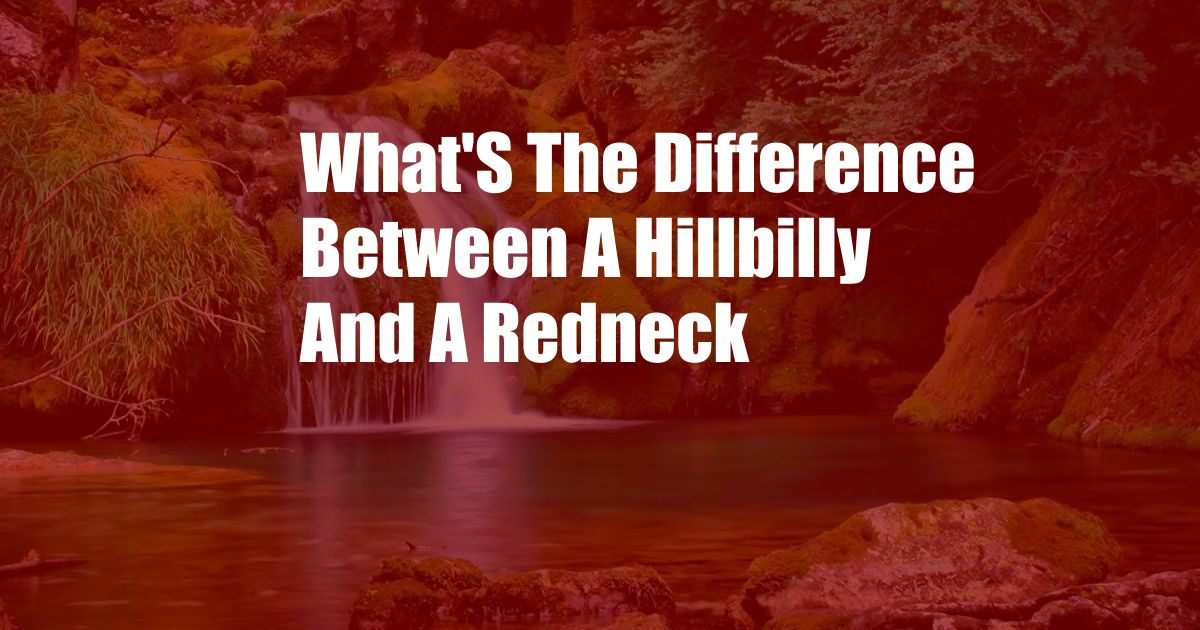
What’s the Difference Between a Hillbilly and a Redneck?
Growing up in rural Kentucky, I often heard the terms “hillbilly” and “redneck” bandied about. People used these labels to categorize people who lived in poverty, lacked education, and behaved in ways others perceived as uncouth. As a child, I didn’t fully understand the distinction, assuming they were synonyms for “country bumpkin.” As I grew older, I realized that these terms carry distinct connotations and reflect complex social dynamics.
While both “hillbilly” and “redneck” are often used as derogatory slurs, there are subtle distinctions between the two. A hillbilly is typically from the Appalachian Mountains, a region known for its rugged terrain, isolation, and poverty. The term “hillbilly” originated in the early 19th century and was initially used to describe poor white settlers who farmed the mountainsides. Over time, the word acquired a negative connotation, implying laziness, ignorance, and backwardness.
The Redneck Stereotype
In contrast, the term “redneck” is more common in the Southern United States and often applies to people from rural areas who work in blue-collar jobs. The origin of the term is less clear, but some believe it stems from the reddish skin tone caused by sunburn. Additionally, the term “redneck” has been used to describe Confederate soldiers during the Civil War, reinforcing the association with Southern culture.
The redneck stereotype is often associated with hard work, drinking, hunting, and driving pickup trucks. While there is some truth to these generalizations, it’s important to realize that they often paint an incomplete picture of a diverse population. Many people who identify as rednecks are proud of their heritage and see the label as a badge of honor, signifying their connection to a rural lifestyle and traditional values.
Socioeconomic Factors and Class Differences
Beyond the geographical and cultural differences, there are also socioeconomic factors that contribute to the distinction between hillbillies and rednecks. Hillbillies tend to be poorer, less educated, and live in more isolated areas than rednecks. This is partly due to the historical economic disparities in the Appalachian region, which has long suffered from high levels of poverty and unemployment.
Rednecks, on the other hand, are often working-class people who live in rural or suburban areas. They may have blue-collar jobs in industries such as farming, construction, or manufacturing. While not wealthy, they generally have more economic opportunities than hillbillies.
Contemporary Usage and the Power of Language
In contemporary usage, the terms “hillbilly” and “redneck” are often used interchangeably, despite the subtle historical distinctions. Both terms can carry negative connotations and should be used with caution. It’s important to remember that people are not stereotypes, and we should avoid making assumptions based on someone’s appearance or background.
Language has the power to both empower and denigrate, and the words we use to describe others can have a profound impact. When it comes to labels like “hillbilly” and “redneck,” we should be mindful of the historical context and socioeconomic factors that have shaped these terms.
Tips for Avoiding Offensive Language
If you want to avoid using potentially offensive language, here are a few tips:
- Use more specific terms to describe people, such as “rural resident” or “Appalachian farmer” instead of “hillbilly.”
- Avoid using generalizations or stereotypes when discussing groups of people.
- Be respectful of people’s backgrounds and cultures, even if they differ from your own.
By following these tips, you can communicate with more sensitivity and avoid inadvertently offending others.
FAQs on Hillbillies and Rednecks
- Q: What’s the main difference between a hillbilly and a redneck?
- A: Hillbillies are typically from the Appalachian Mountains and live in poverty, while rednecks are from the Southern United States and work in blue-collar jobs.
- Q: Are the terms “hillbilly” and “redneck” offensive?
- A: These terms can be offensive, especially when used as slurs. It’s better to use more specific and respectful language when describing people.
- Q: Why is it important to avoid stereotypes?
- A: Stereotypes can be harmful because they oversimplify and misrepresent people. They can also contribute to discrimination and prejudice.
Conclusion
In conclusion, the terms “hillbilly” and “redneck” have distinct historical and cultural connotations. They reflect socioeconomic factors, geographic origins, and cultural values. While these labels can be used to categorize people, it’s crucial to remember that they are not monolithic and should not be used to make assumptions about individuals.
By understanding the nuances and complexities of these terms, we can engage in more respectful and inclusive conversations. It’s time to move beyond stereotypes and embrace the diversity and richness of our society.
Are you interested in learning more about the unique cultures and experiences of hillbillies and rednecks? I’d love to hear your thoughts and perspectives in the comments below.